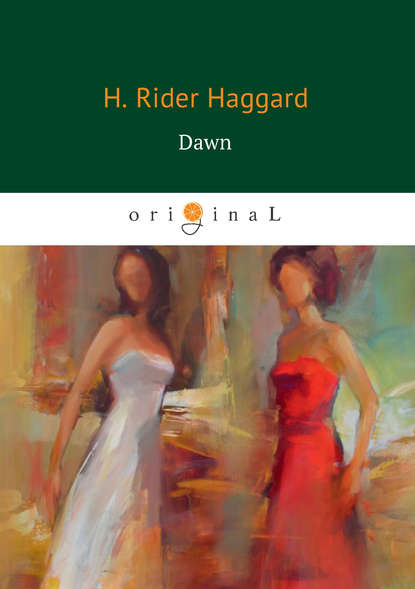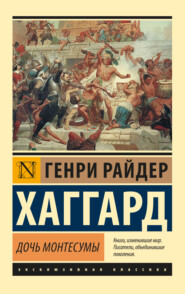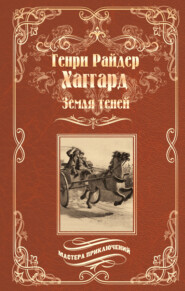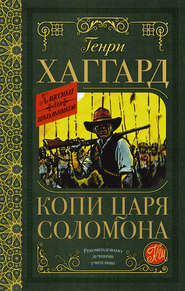По всем вопросам обращайтесь на: info@litportal.ru
(©) 2003-2025.
✖
Dawn
Настройки чтения
Размер шрифта
Высота строк
Поля
"And now I have done; I have already kept you too long. With your consent, we will have no more speeches, no returning of thanks; we will spare Philip his blushes. But before I sit down I will bid you all farewell, for I am in my eighty-third year, and I feel that I shall never see very many of your faces again. I wish that I had been a better neighbour to you all, as there are many other things I wish, now that it is too late to fulfil them; but I still hope that some of you will now and again find a kind thought for the old man whom among yourselves you talk of as ‘Devil Caresfoot.’ Believe me, my friends, there is truth in the old proverb: the devil is not always as black as he is painted. I give you my toast, my son Philip and his affianced wife, Maria Lee.”
The whole company rose, actuated by a common impulse, and drank the health standing; and such was the pathos of the old squire’s speech, that there were eyes among those present that were not free from tears. Then the ladies retired, amongst them poor Maria, who was naturally upset at the unexpected, and, in some ways, unwelcome notoriety thus given to herself.
In the drawing-room, she was so overwhelmed with congratulations, that at last, feeling that she could not face a fresh edition from the male portion of the gathering, she ordered her carriage, and quietly slipped away home, to think over matters at her leisure.
Philip, too, came in for his share of honours down below, and acknowledged them as best he might, for he had not the moral courage to repudiate the position. He felt that his father had forced his hand completely, and that there was nothing to be done, and sank into the outward calmness of despair. But if his companions could have seen the whirlpool of hatred, terror, and fury that raged within his breast as he sat and chatted, and sipped his great-grandfather’s port, they would have been justifiably astonished.
At length the banquet, for it was nothing less, came to an end, and, having bowed their farewell to the last departing guest, the old man and his son were left alone together in the deserted drawing-room. Philip was seated by a table, his face buried in his hand, whilst his father was standing by the dying fire, tapping his eye-glass nervously on the mantelpiece. It was he who broke the somewhat ominous silence.
"Well, Philip, how did you like my speech?”
Thus addressed, the son lifted his face from his hand; it was white as a sheet.
"By what authority,” he asked in a harsh whisper, "did you announce me as engaged to Miss Lee?”
"By my own, Philip. I had it from both your lips that you were engaged. I did not choose that it should remain a secret any longer.”
"You had no right to make that speech. I will not marry Miss Lee; understand once and for all, I will not marry her.”
In speaking thus, Philip had nerved himself to bear one of those dreadful outbursts of fury that had earned his father his title; but, to his astonishment, none such came. The steely eyes glinted a little as he answered in his most polite manner, and that was all.
"Your position, Philip, then is that you are engaged, very publicly engaged, to a girl whom you have no intention of marrying—a very disgraceful position; mine is that I have, with every possible solemnity, announced a marriage that will not come off—a very ridiculous position. Very good, my dear Philip; please yourself. I cannot force you into a disgraceful marriage. But you must not suppose that you can thus thwart me with impunity. Allow me to show you the alternative. I see you are tired, but I shall not detain you long. Take that easy-chair. This house and the land round it, also the plate, which is very valuable, but cannot be sold—by the way, see that it is safely locked up before you go to bed—are strictly entailed, and must, of course belong to you. The value of the entailed land is about 1000 pounds a year, or a little less in bad times; of the unentailed, a clear 4000 pounds; of my personal property about 900 pounds. Should you persist in your refusal to marry Miss Lee, or should the marriage in any way fall through, except from circumstances entirely beyond your control, I must, to use your own admirably emphatic language, ask you to ‘understand, once and for all,’ that, where your name appears in my will with reference to the unentailed and personal property, it will be erased, and that of your cousin George substituted. Please yourself, Philip, please yourself; it is a matter of entire indifference to me. I am very fond of George, and shall be glad to do him a good turn if you force me to it, though it is a pity to split up the property. But probably you will like to take a week to consider whether you prefer to stick to the girl you have got hold of up in town there—oh, yes! I know there is some one—and abandon the property, or marry Miss Lee and retain the property—a very pretty problem for an amorous young man to consider. There, I won’t keep you up any longer. Good night, Philip, good night. Just see to the plate, will you? Remember, you have a personal interest in that; I can’t leave it away.”
Philip rose without a word and left the room, but when he was gone it was his father’s turn to hide his face in his hands.
"Oh, God!” he groaned aloud, "to think that all my plans should come to such an end as this; to think that I am as powerless to prevent their collapse as a child is to support a falling tree; that the only power left me is the power of vengeance—vengeance on my own son. I have lived too long, and the dregs of life are bitter.”
Chapter IX
Poor Hilda found life in her London lodging anything but cheerful, and frequently begged Philip to allow her to settle somewhere in the country. This, however, he refused to do on two grounds: in the first place, because few country villages would be so convenient for him to get at as London; and in the second, because he declared that the great city was the safest hiding-place in the world.
And so Hilda continued perforce to live her lonesome existence, that was only cheered by her husband’s short and uncertain visits. Friends she had none, nor did she dare to make any. The only person whose conversation she could rely on to relieve the tedium of the long weeks was her landlady, Mrs. Jacobs, the widow of a cheesemonger, who had ruined a fine business by his drinking and other vicious propensities, and out of a good property had only left his wife the leasehold of a house in Lincoln’s Inn Fields, which, fortunately for her, had been settled upon her at her marriage. Like most people who have seen better days—not but what she was now very comfortably off—she delighted in talking of her misfortunes, and of the perfidiousness of man; and in Hilda, who had, poor girl, nothing else to listen to, she found a most attentive audience. As was only natural where such a charming person and such a good listener were concerned, honest Mrs. Jacobs soon grew fond of her interesting lodger, about whose husband’s circumstances and history she soon wove many an imaginary tale; for, needless to say, her most pertinent inquiries failed to extract much information from Hilda. One of her favourite fictions was that her lodger was the victim of her handsome husband, who had in some way beguiled her from her home beyond the seas, in order to keep her in solitary confinement and out of the reach of a hated rival. Another, that he kept her thus that he might have greater liberty for his own actions.
In course of time these ideas took such possession of her mind that she grew to believe in them, and, when speaking of Hilda to any of her other lodgers, would shake her head and talk of her mysteriously as a "lamb” and a "victim.”
As for that lady herself, whilst far from suspecting her good landlady’s gloomy surmises, she certainly fell more and more a prey to depression and anxieties, and occasionally even to suspicion, to all of which evils she grew increasingly liable as she drew nearer to an event that was no longer very distant. She could not but notice a change in Philip’s manner on the rare occasions when he was able to visit her, of which the most marked developments were fits of silence and irritability. A certain reticence also, that became more and more noticeable as time went on, led her to feel that there was an invisible something growing up between them—a something that the pride she possessed in such a striking degree forbade her to attempt to pierce, but which was none the less galling to her on that account. Very shortly before the events narrated in the last chapter she had taken the occasion of a visit from Philip to complain somewhat bitterly of her position, begging him to tell her when there was any prospect of her being allowed to take her rightful place —a question her husband was quite unable to answer satisfactorily. Seeing that there was nothing to be got out of him, with womanly tact she changed the subject, and asked after Maria Lee (for whom she entertained a genuine affection)—when he last saw her, how she was looking, if there was any prospect of her getting married, and other questions of the same sort —the result of which was to evoke a most violent, and to her inexplicable, fit of irritability on the part of her husband. Something of a scene ensued, which was finally terminated about five o’clock in the afternoon by Philip’s abrupt departure to catch his train.
Shortly afterwards Mrs. Jacobs, coming up to bring some tea, found Hilda indulging in tears that she had been too proud to shed before her husband; and, having had an extended personal experience of such matters, rightly guessed that there had been a conjugal tiff, the blame of which, needless to say, she fixed upon the departed Philip.
"Lor, Mrs. Roberts” (as Hilda was called), she said, "don’t take on like that; they’re all brutes, that’s what they are; if only you could have seen my Samuel, who’s dead and gone these ten years and buried in a private grave at Kensal Cemetery—though he didn’t leave anything to pay for it except three dozen and five of brandy—he was a beauty, poor dear, he was; your husband ain’t nothing to him.”
"My husband, let me tell you, Mrs. Jacobs, is not a brute at all,” sobbed Hilda, with dignity.
"Ah, Mrs. Roberts, that is just what I used to say of Samuel, but he was the biggest brute in the three kingdoms, for all that; but if you ask me, meaning no offence, I call a man a brute as only comes to see his lawful wife about twice a month, let alone making an angel cry.”
"Mr. Roberts has his reasons, Mrs. Jacobs; you must not talk of him like that.”
"Ah, so my Samuel used to say when he stopped away from home for three nights at a time, till I followed him and found out his ‘Reason,’ and a mighty pretty ‘Reason’ she was too, all paint and feathers, the hussy, and eyes as big as a teacup. They all have their reasons, but they never tell ‘em. But come and put on your things and go out a bit, there’s a dear; it is a beautiful warm evening. You feel tired—oh, never mind that; it is necessary for people as is in an interested way to take exercise. I well remembers—”
Here Hilda, however, cut the subject short, and deprived herself of Mrs. Jacobs’ reminiscences by going to put on her things.
It was a bright warm evening, and she found the air so pleasant that, after strolling round Lincoln’s Inn Fields, she thought she would extend her walk a little, and struck past Lincoln’s Inn Hall into New Square, and then made her way to the archway opposite to where the New Law Courts now stand. Under this archway a legal bookseller has built his nest, and behind windows of broad plate-glass were ranged specimens of his seductive wares, baits on which to catch students avaricious of legal knowledge as they pass on their way to chambers or Hall. Now, at this window a young man was standing at the moment that Hilda entered the archway, his eyes fixed upon a pamphlet on the laws of succession. That young man was George Caresfoot, who was considering whether it would be worth his while to buy the pamphlet in order to see if he would be entitled to anything if his uncle should happen to die intestate, as he sometimes feared might be the case. He had come up to town on business connected with his firm, and was now waiting till it was time to begin an evening of what he understood as pleasure; for George was a very gay young man.
He was, however, also a very sharp one, so sharp that he even noticed shadows, especially when, as in this case, the shadow was clearly defined and flung, life-sized, on the dark background of the books before him. He watched it for a moment, and as its owner, with an absent air, slowly passed from the bright sunlight into the shade of the arch, it struck the astute George that there was something familiar about this particular and by no means unpleasing shadow. Waiting till it had vanished and the footsteps gone past him, he turned round and at a glance recognized Hilda von Holtzhausen, Miss Lee’s beautiful companion, who was supposed to have departed into the more distant parts of Germany. George’s eyes twinkled, and a whole host of ideas rushed into his really able mind.
"Caught at last, for a sovereign,” he muttered.
Meanwhile Hilda walked slowly on into Chancery Lane, then turned to the left till she came into Holborn, and thence made her way round by another route back to Lincoln’s Inn Fields. Needless to say, George followed at a respectful distance. His first impulse had been to go up and speak to her, but he resisted the inclination.
On the doorstep of the house where Hilda lodged, stood her landlady giving a piece of her mind to a butcher-boy both as regarded his master’s meat and his personal qualities. She paused for breath just as Hilda passed up the steps, and, turning, said something that made the latter laugh. The butcher-boy took the opportunity of beating a rapid retreat, leaving Mrs. Jacobs crowing after him from her own doorstep. As soon as Hilda had gone into the house, George saw his opportunity. Advancing politely towards Mrs. Jacobs, he asked her if she was the landlady of the house, and, when she had answered in the affirmative, he made inquiries about apartments.
"Thank you, sir,” said Mrs. Jacobs, "but I do not let rooms to single gentlemen.”
"You take too much for granted, ma’am. I am married.”
She looked at him doubtfully. "I suppose, sir, you would have no objection to giving a reference.”
"A dozen, if you like, ma’am; but shall we look at the rooms?”
Mrs. Jacobs assented, and they made their way upstairs, George keeping in front. On the first-floor he saw a pair of lady’s shoes on a mat outside the door, and guessed to whom they belonged.
"Are these the rooms?” he said, laying his hand upon the door-handle.
"No, sir, no, they are Mrs. Roberts’; next floor, please, sir.”
"Mrs. Roberts?—I suppose the very handsome young lady I saw come into the house. No offence, ma’am; but a man’s bound to be careful where he brings his wife. I suppose she’s all right.”
"Lord, yes, poor dear!” answered Mrs. Jacobs, in indignation; "why, they came here straight from St. Jude’s, Battersea, the day they were married; a runaway match, I fancy.”
"That’s all right; she looked charming. I hope her husband is worthy of her,” remarked George, as he gazed round Mrs. Jacobs’ rooms.
"Well, as to that, he’s handsome enough, for them as likes those black men; but I don’t like people as only comes to visit their lawful wives about twice a month. But,” suddenly checking herself, "it isn’t any affair of mine.”
"No, indeed, very reprehensible: I am, as a married man, entirely of your mind. These are charming rooms, ma’am, charming. I shall certainly take them if my wife approves; I will let you know by to-morrow’s post—Jacobs, yes, I have it down. Good evening, ma’am,” and he was gone.
Instead of going out that evening as he had intended, George sat in the smoking-room of his hotel and thought. He also wrote a letter which he addressed to Mrs. Bellamy.
Next morning, taking a cab, he drove to St. Jude’s, Battersea, and inspected the register.
Presently he asked for a certified copy of the following entry: "August 1, 1856. Philip Caresfoot, bachelor, gentleman, to Hilda von Holtzhausen, spinster (by license). Signed J. Few, curate; as witness, Fred. Natt, Eliza Chambers.”
That evening Hilda received an anonymous letter, written in a round clerk’s hand, that had been posted in the City. It was addressed to Mrs. Roberts, and its contents ran thus:
"A sincere friend warns Mrs. Philip Caresfoot that her husband is deceiving her, and has become entangled with a young lady of her acquaintance. Burn this; wait and watch!”
The letter fell from her hands as though it had stung her.
"Mrs. Jacobs was right,” she said aloud, with a bitter laugh, "men always have a ‘reason.’ Oh, let him beware!” And she threw back her beautiful head and the great blue eyes sparkled like those of a snake about to strike. The sword of jealousy, that she had hitherto repelled with the shield of a woman’s trust in the man she loves, had entered into her soul, and, could Philip have seen her under these new circumstances, he would have realized that he had indeed good reason to "beware.” "No wonder,” she went on, "no wonder that he finds her name irritating upon my lips; no doubt to him it is a desecration. Oh, oh!” And she flung herself on her face, and wept tears of jealous rage.

















